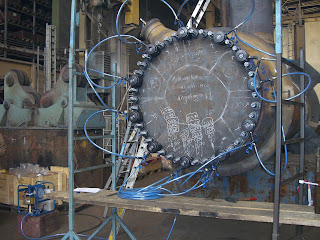What is Tensioning?
Processing Re-write Suggestions Done (Unique Article) Tensioning is that the direct axial stretching of the bolt to attain preload. Inaccuracies created through friction square measure eliminated. Massive mechanical effort to form torque is replaced with straight forward hydraulic pressure. the same load
can be applied by tensioning multiple studs at the same time.
Tensioning needs longer bolts, and a seats on the assembly around the nut. Tensioning will be done victimisation clastic Bolt Tensioners or Hydraulic buggy.
There are 3 way to Tension:-
1.Heat
2.Hydraulic Tensioners
3.Mechanical Tensioners
1. Tensioning with Heat:-
Gas Bolt Heater:-
Objective:-
Correctly setup a gas bolt heater
Properly adjust oxy-acetylene flame
Correctly adjust air flow
Safely operate a gas bolt heater
Design:-
Heating causes a bolt to grow in length
Relieves tension on the bolt
Gas Bolt Heater is machined from solid Stainless Steel
A single-bolt heater can be adapted to fit most bolt sizes by changing the heating tube diameter and length
Heater
Gas Bolt Heater
Processing Re-write Suggestions Done (Unique Article) Tensioning is that the direct axial stretching of the bolt to attain preload. Inaccuracies created through friction square measure eliminated. Massive mechanical effort to form torque is replaced with straight forward hydraulic pressure. the same load
can be applied by tensioning multiple studs at the same time.
Tensioning needs longer bolts, and a seats on the assembly around the nut. Tensioning will be done victimisation clastic Bolt Tensioners or Hydraulic buggy.
There are 3 way to Tension:-
1.Heat
2.Hydraulic Tensioners
3.Mechanical Tensioners
1. Tensioning with Heat:-
Gas Bolt Heater:-
Objective:-
Correctly setup a gas bolt heater
Properly adjust oxy-acetylene flame
Correctly adjust air flow
Safely operate a gas bolt heater
Design:-
Heating causes a bolt to grow in length
Relieves tension on the bolt
Gas Bolt Heater is machined from solid Stainless Steel
A single-bolt heater can be adapted to fit most bolt sizes by changing the heating tube diameter and length
Operation:-
Select a heating tube that is 1/8” smaller than the hole in the bolt and approximately 3” shorter than the depth of the hole
Install heating tube in bolt heater
Use stainless steel reducing bushing for smaller heating tubes
Use high-temperature thread compound
Tighten hand tight
Connect air line to bolt heater
Air pressure should be between 50-100 PSI
Set oxygen pressure to 14 PSI
Set Acetylene pressure to 7 PSI
Use Victor #5-W gas welding tip
Always use check valves
Adjust the flame to obtain a carburizing flame
Carburizing flame has an acetylene feather
Insert bolt heater into the bolt
Purge bolt cavity with air
Turn the air valve off
Insert welding tip into gas bolt heater
Gradually open the air valve approximately 1/8 turn
Observe the color of the heating tube through vent holes in the gas bolt heater
Maintain a cherry red color by adjusting the air valve
More air is cooler
Less air is hotter
For proper operation, a balance of pressure must be maintained between the welding tip and heating chamber back pressure
Excess back pressure will result in welding tip back-fire
If a back-fire occurs, close the acetylene valve, remove the welding tip from the bolt heater, purge the bolt cavity with air, and restart the heating process
PRO’S:
Minimum Muscle
CON’S:
Hot
Slow
Inaccurate
Hard on Studs
Must have hole
Rough on gaskets
2. Hydraulic Tensioners
Various type of Hydraulic Tensioners
1.Top Connect
2.Side Connect
3.Hydraulic Nut
Top Connect Side Connect Hydraulic Nut
3.Mechanical Tensioner:-
-Multiple Work
-Takes Forever
-Tiny Load Points
-Cant check Results
SIONERS
HYDRAULIC
VARIOUS TYPE OF HYDRAULIC TENSIONERS
Gas Bolt Heater






